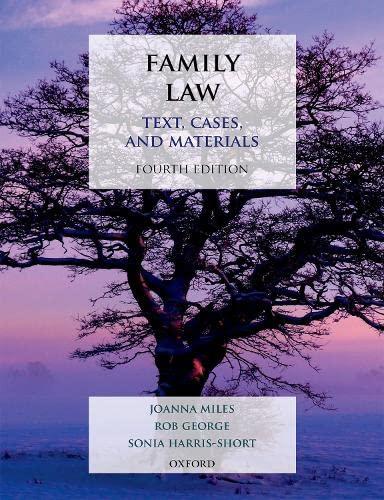Question
Summarize what the paragraphs speak about in an explanation? Intestate Succession: Interstate represents people who died without a will. When this occurs the state law
Summarize what the paragraphs speak about in an explanation?
Intestate Succession:
Interstate represents people who died without a will. When this occurs the state law steps in to determine how the deceased's estate and assets will be distributed. The laws responsible for intestate are known as intestate succession laws and used in placement for non-existent wills. The tricky part about intestate succession laws is how every state handles the assets differently and if the deceased had assets or estates in different states, both or more have to step in and work out a compromise over the distribution. They try to keep it similar and reasonable, but the differences in the laws complicate manners.
How intestate succession laws distribute a deceased person's assets is by giving them to the closest living relative. In some states, it is given to the spouse or parents or children, but in others it is split between the spouse and the parents of the deceased. Additionally, if the deceased person had children and a spouse, it must be divided between them, even if the children are minors. The main problem with intestate succession is the basic approach the laws take when distributing the assets. It follows the same scheme, not allowing for the personal preferences that the person wanted, which could cause disputes between family members. According to Downs Law Firm, while the distribution between relatives sounds fine on paper, there are 3 reasons why it's better to have a will to control what that is. First, it creates problems for children who have disabilities that prevents them from legally claiming assets. The intestate succession laws do not take into consideration this. Second, it leads to conflicts between children and spouses if they do not have the best relationship. Lastly, it accounts for extramarital children who have the right to inherit part of the assets as well, which leads to disputes between family members (2019).
Abandoned, Lost, and Misplaced Property:
Property can be displaced in one of three ways excluding stealing. According to Morgan, in Business Law, property is abandoned if the owner of said property does not claim it back (2019, p.g. 205). Property is lost if the property got misplaced and is found and retrieved rather than picked from. Misplaced is where the owner intentionally places their property in a certain spot but forgot to pick it up. It is misplaced when there is the assumption that the owner will come back for it eventually. It is important to note these three kinds of displaced property as it declares whether a property belongs to someone still or not. Abandon is considered no longer the owner's property and can be taken by someone else. The other two, lost and misplaced, are still under the assumption that it belongs to the owner and should not be taken away.
References:
Downs Law Firm., (2019, April 13). Intestate succession and its fallout. Downs Law Firm, P.C., https://www.downslawfirm.com/intestate-succession-and-why-you-should-avoid-it/.
Morgan, J. F. (2019). Business Law (6th ed.). BVT Publishing.
Step by Step Solution
There are 3 Steps involved in it
Step: 1

Get Instant Access to Expert-Tailored Solutions
See step-by-step solutions with expert insights and AI powered tools for academic success
Step: 2

Step: 3

Ace Your Homework with AI
Get the answers you need in no time with our AI-driven, step-by-step assistance
Get Started


